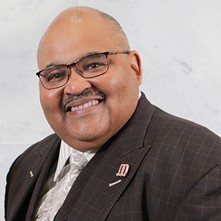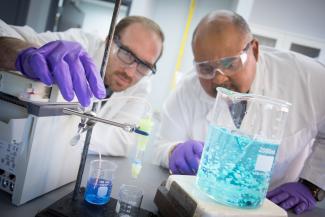On more than one occasion, colleagues have suggested that NETL’s McMahan “Mac” Gray may soon need a larger display case to hold the numerous honors and awards he has received for  advancing cutting-edge solutions to complex energy issues.
advancing cutting-edge solutions to complex energy issues.
The research chemist joined NETL in 1986 and has served as principal investigator for multiple innovations, including NETL’s basic immobilized amine sorbent (BIAS) technology — a breakthrough discovery capable of capturing greenhouse gas emitted by power plants that earned Gray a prestigious R&D 100 award.
Multiple organizations have recognized Gray’s work. For instance, the Edison Awards Steering Committee cited Multi-functional Sorbent Technology (MUST), developed by Gray’s research team, for scientific excellence based on its ability to remove toxic elements from acid mine drainage that pollutes rivers, lakes and streams and extract valuable rare earth elements from water sources.
The long list of accolades doesn’t end there.
Gray has also received the Federal Laboratory Consortium Mid-Atlantic Region Award for Technology Transfer, the Federal Laboratory Consortium National Award for Excellence in Technology Transfer, the Hugh Guthrie Award for Innovation as one of NETL’s leading scientists, the Gold Medal for Outstanding Contribution to Science (Non-Medical) from the Federal Executive Board for Excellence in the Government, an Innovator Award from The Pittsburgh Business Times, and others.
In his personal life, Gray serves as the longtime pastor for a church near his home in Penn Hills, Pennsylvania. He recently discussed the experiences that sparked his early interest in science, the career path that brought him to NETL and the importance of his work at the Lab and in his community.
How did you become interested in science?
I grew up in Homewood, a Pittsburgh neighborhood. I was in fifth grade when I completed my first science experiment. It involved placing a celery stalk in water colored with red food dye, which caused the celery to change color as it absorbed the water. The experiment taught me about the movement of liquids through narrow spaces such as veins and roots. I became fascinated with learning how things worked.
Were you born in Pittsburgh?
I was born in South Carolina. We moved to Pittsburgh because there were better economic opportunities for African Americans in northern cities. My father held two jobs. He was an autobody man and repaired cars when he got home. My parents expected us to study and do well in school. We had a strong family structure, and I was raised in a Christian home. One thing was made abundantly clear — if you were not on the honor roll, that was a serious problem.
I graduated from Westinghouse High in 1976. At the University of Pittsburgh, I studied chemistry and was a member of the marching band when Pitt had some excellent teams. I was the trombone section leader and was named Pitt Bandsman of the Year. Plus, I met my wife, Tometta, at Pitt. Our son, Thomas, studied at the Rochester Institute of Technology, and works as an operations manager in Cleveland.
What were your initial career goals?
I wanted to be an industrial organic chemist at a major company. I joined Koppers. But in the early 1980s, many large companies in Pittsburgh started to downsize their technical staffs and I was laid off. A professional friend recommended that I apply to NETL, and I did. It’s turned out to be a great decision.
NETL is focused on addressing climate change by advancing sustainable energy technologies for the American people. What’s your approach to getting that work done?
I’m someone who looks at a problem, prays about it and gets to work. My motivation is to get people clean water and clean air. I just believe that we should be good stewards of the Earth.
How long have you been a pastor?
I have been a pastor for 27 years at the Second Baptist Church of Penn Hills. When I was younger, I was active in street evangelism. I worked with people struggling with addiction and in a variety of programs, including those that taught single mothers how to cook from scratch because those foods cost less and are healthier than items that contain preservatives.
You don’t ever retire from the church, but in the next few years I will be scaling back, so I am starting the process of finding a young associate to take my place.
Tell me about some of your other interests?
I’m from the school of “let’s help somebody.” It is important to give back. Through my involvement in my fraternity, Omega Psi Phi, I have been involved in projects with Pittsburgh Public Schools to help students and other projects that provide a helping hand to families in need.
I also have worked as a program chairman and technical reviewer with America’s Historically Black Colleges and Universities to guide and monitor projects that provide key experiences for aspiring energy researchers.
You have received many awards for your work. Is there one that stands out as especially meaningful?
A few years ago, I was named a Distinguished Alumni in the Department of Chemistry at the University of Pittsburgh. There are many people who can succeed if given the opportunity. That was certainly true for me. The scholarships I received opened the door for me to study at Pitt.
Unlike many of my colleagues, I do not have a doctorate-level degree. However, NETL has provided me with the platform to work with an outstanding team and expand my skills and knowledge to advance projects that provide real solutions to real problems that impact every single person, not just in the U.S., but globally. It has been a privilege to work at NETL.
NETL is a U.S. Department of Energy national laboratory that drives innovation and delivers technological solutions for an environmentally sustainable and prosperous energy future. By leveraging its world-class talent and research facilities, NETL is ensuring affordable, abundant and reliable energy that drives a robust economy and national security, while developing technologies to manage carbon across the full life cycle, enabling environmental sustainability for all Americans.





 advancing cutting-edge solutions to complex energy issues.
advancing cutting-edge solutions to complex energy issues.